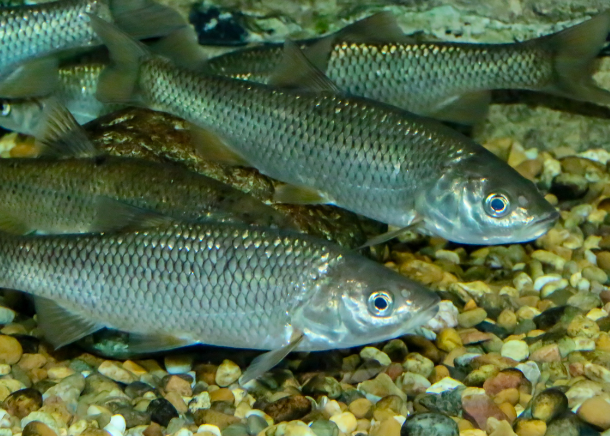Summary:
Hybridization, i.e. mating between different species or genetically distinct lineages, has puzzled evolutionary biologists for a long time. Genomic data revolutionized the field, showing that hybridization is common across many taxa, and opening the door to understand its impacts at the genomic level. Genomes shaped by hybridization have a mixture of genes from different species, which can have opposing effects. New combinations of genes can promote adaptation (adaptive introgression), but they can also lead to genetic incompatibilities (Dobzhansky-Muller incompatibilities, DMI) that reduce fitness. How this genetic conflict resolves is crucial, yet there are few cases where both DMIs and genes involved in environmental adaptation are known. These limitations are in part due to a lack of bioinformatic methods to identify such genomic regions. Due to global climatic change, the environment of many domesticated and natural species is changing beyond their tolerance limits. As a consequence, many species are shifting their ranges, entering in contact with other native or invasive species, which increases hybridization rates. It is thus important to understand whether hybridization can promote species’ response to environmental changes, and what are the molecular processes involved. Given their mixed genomes, hybrid individuals can potentially regulate what parental genes are expressed in a given environment. Such type of phenotypic plasticity has been proposed as a mechanism for rapid response to environmental change. These mechanisms can be especially relevant for the thermal stress response of ectotherms, which constantly fine-tune gene expression according to temperature. However, few studies quantified how hybrid genomes regulate transcriptomic and proteomic response to changes in environmental variables. Thus, it is still unclear how hybridization can promote rapid adaptation and what are the molecular and evolutionary processes involved. We will tackle these challenging questions by focusing on thermal tolerance of ectothermic species affected by past hybridization events. We will use as a model system the endemic freshwater fish species of genus Squalius, which are distributed across different climatic types that differ in temperature (Atlantic and Mediterranean). To characterize the link between genomes shaped by hybridization and their response to environmental changes, we will combine theoretical developments with data from several omics-approaches (genomics, transcriptomics and proteomics) obtained from natural populations and in vitro experiments. This project has three specific aims: 1 - characterize the genomic signatures of DMIs and adaptive introgression; 2 - infer the genomic distribution of DMIs and adaptive introgression in species with different thermal tolerance; and 3 - dissect the transcriptomic and proteomic response of hybrid genomes to thermal stress. These will link theoretical developments (Aim 1) with genomic data from natural populations (Aim 2), to the molecular mechanisms that regulate the response of individuals with genomes shaped by hybridization (Aim 3). Based on the expertise of the PI and CB, we will use models and simulations to characterize the genomic signatures of DMIs and adaptive introgression, developing new bioinformatic methods to detect them. Based on the expertise of the co-PI CSS, PF, MS and VS, we will obtain population genomics data from natural populations of Squalius species and generate a reference genome. By applying the developed methods, we will be able to infer the demographic history (i.e. date and quantify introgression) and infer distribution of genes involved in DMIs and adaptive introgression. Finally, based on the experience of RS and GR, we will compare the phenotypic plasticity of hybrid and parental genomes by using in vitro tests with cell cultures. We will derive cell lines from natural populations and exposed them to different temperatures, characterizing their transcriptomic and proteomic response profiles, while controlling for their genomic background. We will take an integrative and interdisciplinary approach, crossing from the development of bioinformatic methods to genomic data from natural populations, and in vitro experiments. Results will allow us to characterize in unprecedented detail the impacts of hybridization, linking evolutionary processes acting at the genome level with the individual’s response to environmental changes. Importantly, these processes underlie emergent societal concerns, reflected in EU policies priorities, from biodiversity conservation to agriculture and human health (e.g. impact of hybridization with invasive species, response of crops to increased temperature, and evolution of resistance in human pathogens). Finally, the outcomes of this project include new software and protocols, providing a transferable framework to address these fundamental and applied questions in a wide range of species.
Funding Institution:
Fundação para a Ciência e a Tecnologia (FCT)
Partners:
Instituto Universitário de Ciências Psicológicas Sociais e da Vida (ISPA)
MARE - Investigação - ISPA - Centro de Ciências do Mar e do Ambiente - ISPA Instituto Universitário (MARE-ISPA)
Eawag: Swiss Federal Institute of Aquatic Science and Technology (Eawag)
University of Bern - Institute of Ecology and Evolution (UB)
Website







